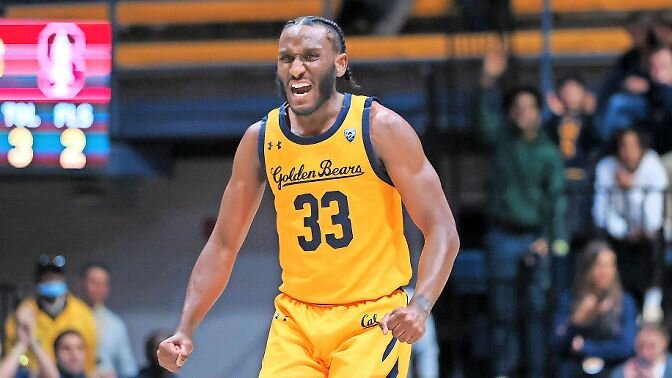Clayton takes NCAA, Manhattan College to court over eligibility
DeJuan Clayton could become first to appear in 8 seasons
DeJuan Clayton remains on the outside looking in as he attempts to resume his college basketball career at Manhattan College.
Eying an eighth year of athletic eligibility due to injuries and the coronavirus pandemic, Clayton has now asked a state supreme court judge to compel the NCAA and Manhattan College to let him play for the Jaspers — something the collegiate association has refused to do.
Clayton enrolled at Manhattan last September, expecting to play out his final year of eligibility on the hardwood. At 26, Clayton would not only qualify as the oldest player in Division I, but also would become the first player in DI basketball to appear in games across eight different seasons.
That’s after stints at Coppin State University in Baltimore, the University of Hartford in Connecticut, and University of California-Berkeley, as part of a college career that begun in 2016.
Clayton competed for five seasons at Coppin State, including a sophomore campaign derailed by injury, which limited him to only six games. His fifth season started in 2020, mostly remembered for its pandemic-related storylines, and which ultimately didn’t count toward the four-year eligibility limit for NCAA athletes.
That was only the start of the dicey path for Clayton, however. After earning an undergraduate degree from Coppin State, Clayton moved on to Hartford, where he was sidelined for all but two games due to a shoulder injury as he pursued yet another degree.
That prompted another change of scenery, albeit what his attorney described as the worst one yet.
Clayton’s lone season at Cal went awry for factors ranging from a bout of hamstring injuries to what his lawsuit claims the guard being “forced to endure harsh and egregious treatment of the Cal coaching staff, while simultaneously enduring other well-documented physical and mental health issues.”
Cal-Berkeley, Manhattan College nor the NCAA returned requests for comment.
Diana Florence, who represents Clayton in his legal action, told The Riverdale Press that instead of financial accommodations, Cal forced Clayton to pay for his own plane ticket for a flight from Maryland to California over the summer in 2022.
Once he arrived, Clayton was not set up with housing by the school, and instead, was resigned to sleeping on a couch in a teammate’s apartment.
“He didn’t have any stipends,” Florence said. “He was forced to work, and also do a Division I practice schedule.”
Clayton suffered multiple hamstring injuries at Cal, Florence said. Despite that, Clayton claims the coaches there “pressured” him into returning to the lineup before finishing rehabilitation without any restrictions to protect him from further injury.
“His very first game back, he played 38 minutes, and he did that because the coaches were saying things like, ‘You are our only hope,’” Florence said. “They didn’t act in the best interests of the student-athlete, but instead their own professional interests.”
The men’s basketball coaching staff at Cal has since been replaced. For Clayton, he just wants to move on and play basketball again. However, the situation he faces is far more complicated.
To earn a medical waiver from the NCAA to maintain eligibility, an athlete can only play in fewer than 10 games overall, or less than 30 percent of the team’s overall games. The NCAA denied this waiver to Clayton, according to the suit.
Clayton played in nine games at Cal last season. Yet, Florence believes the NCAA is addressing some issues separately without considering the case holistically.
“The NCAA said they won’t consider the medical, only the egregious coaching conduct, which is absolutely baffling because you cannot consider one piece without the others,” Florence said. “This is all part of DeJuan’s story.”
In the suit, Clayton charges a lack of transparency behind the NCAA’s review, believing the collegiate organization claims Clayton’s playing time at Cal may have crossed over into beginning of the championship segment of the basketball season. Clayton’s last appearance came on Feb. 11, 2023.
“The NCAA is hanging on to basketball being a two-season sport with a fall season and championship season,” said Bob Boland, a second attorney representing Clayton. “We can infer that the NCAA believed he played in the championship season.”
Matthew Raidbard, who served as the associate athletic director who oversaw NCAA compliance for Manhattan during the time of Clayton’s transfer, claims NCAA officials openly told him they were going to be much stricter in granting mental health waivers, shortly after a rule was passed that eliminated immediate eligibility for athletes who transferred a second time.
In his own words in an affidavit submitted to the case, Raidbard saw no “rhyme or reason” to the enforcement of waivers by the NCAA.
“This struck me as odd since no changes to the criteria of mental health-related hardship waivers had been implemented,” Raidbard wrote.
Last December, U.S. District Judge John Preston Bailey in West Virginia ruled against the NCAA’s two-time transfer rule in a separate case that requires athletes to sit out a year.
According to Boland, the pushback against the NCAA made Clayton’s case more compelling.
“We certainly thought when the injunction in the West Virginia case was granted, we were in a much stronger position to go to court to seek a temporary restraining order or a preliminary injunction,” the attorney said.
Clayton chose to pursue an eighth year to help his prospects of playing professional basketball in the future, Florence said. But as March draws closer, the attorney can’t help but believe the NCAA is “trying to run out the clock.”
“This is not about the next five or 10 basketball games,” Florence said. “It’s about whether he can play on a (professional) team that will pay him a decent wage and give him a satisfying career.”
Clayton and his lawyers are due back in court Feb. 20.







